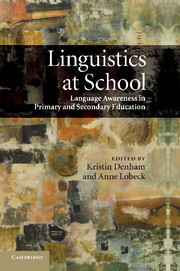Book contents
- Frontmatter
- Contents
- Notes on contributors
- Foreword: The challenge for education
- Introduction
- Part I Linguistics from the top down: encouraging institutional change
- Introduction to Part I
- 1 Ideologies of language, art, and science
- 2 Bringing linguistics into the school curriculum: not one less
- 3 How linguistics has influenced schools in England
- 4 Supporting the teaching of knowledge about language in Scottish schools
- 5 Envisioning linguistics in secondary education: an Australian exemplar
- 6 Linguistics and educational standards: the California experience
- 7 Developing sociolinguistic curricula that help teachers meet standards
- 8 Linguistic development in children's writing: changing classroom pedagogies
- Part II Linguistics from the bottom up: encouraging classroom change
- Part III Vignettes: voices from the classroom
- References
- Index
4 - Supporting the teaching of knowledge about language in Scottish schools
Published online by Cambridge University Press: 04 August 2010
- Frontmatter
- Contents
- Notes on contributors
- Foreword: The challenge for education
- Introduction
- Part I Linguistics from the top down: encouraging institutional change
- Introduction to Part I
- 1 Ideologies of language, art, and science
- 2 Bringing linguistics into the school curriculum: not one less
- 3 How linguistics has influenced schools in England
- 4 Supporting the teaching of knowledge about language in Scottish schools
- 5 Envisioning linguistics in secondary education: an Australian exemplar
- 6 Linguistics and educational standards: the California experience
- 7 Developing sociolinguistic curricula that help teachers meet standards
- 8 Linguistic development in children's writing: changing classroom pedagogies
- Part II Linguistics from the bottom up: encouraging classroom change
- Part III Vignettes: voices from the classroom
- References
- Index
Summary
Introduction
This chapter discusses the current situation in Scotland regarding the provision of teaching of knowledge about language (KAL) in schools, and the increasing collaboration between linguists working at universities, and teachers in schools, in order to produce resources which are functional and relevant to the needs of Scotland's children as they learn about language. The discussion is preceded by a synopsis of the educational system in Scotland, including the Scottish Government's ‘A Curriculum for Excellence’ (ACfE) initiative, which has reassessed the Scottish school system for children and young adults from the ages of 3 to 18. In order to facilitate further discussion of issues relating to the teaching of KAL in Scotland's schools, a recent initiative spearheaded by academics at the University of Edinburgh has sought to bring together academic linguists, educationalists, writers and (most importantly) teachers to form the Committee for Language Awareness in Scottish Schools (CLASS). CLASS seeks to raise awareness of issues surrounding KAL in the Scottish education system, seeking to develop links between the teaching of English and Foreign Languages (both modern and classical), which is also a feature of the ACfE project. Members of CLASS are also engaged in Continuing Professional Development (CPD) work on KAL for existing teachers, as well as offering elective modules on KAL for those currently training as teachers, and visiting schools to speak to groups of teachers and students about relevant KAL issues. Instances of such activities are discussed in this chapter.
- Type
- Chapter
- Information
- Linguistics at SchoolLanguage Awareness in Primary and Secondary Education, pp. 49 - 61Publisher: Cambridge University PressPrint publication year: 2010
- 1
- Cited by

